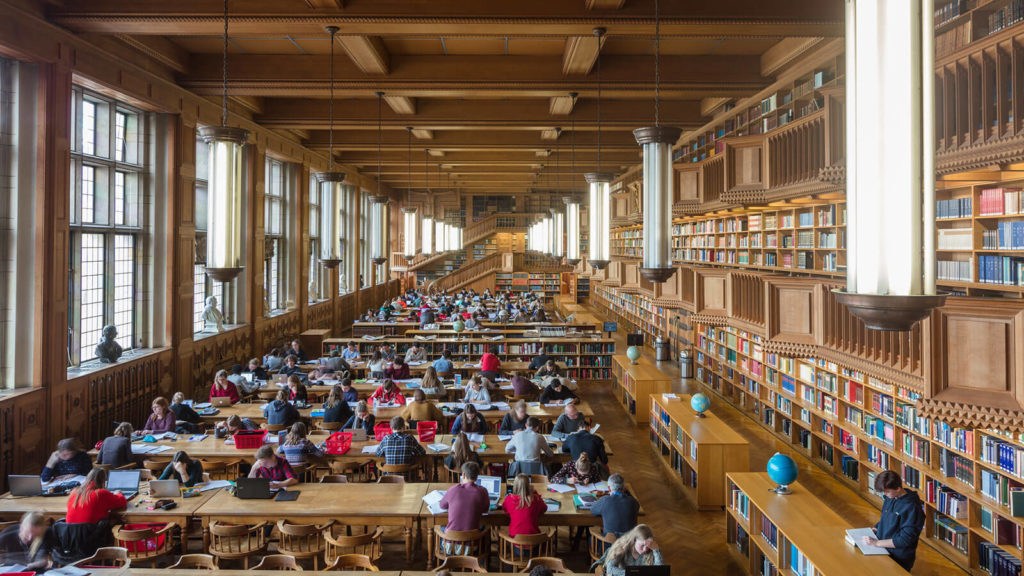While the jury is still out on the long-term sustainability of teleworking in the era of Covid-19 many businesses have responded well to the challenge of organizing a work force remotely.
Banks like ING have even reported increased productivity, yet senior executives at other financial institutions suggest that a lot of our ability to work together is a result of an already existing social capital that organizations work tirelessly to promote.
The prospect for universities and business schools is a little different. One’s ability to learn is heavily dependent on the social relationships they can build with teachers and fellow students. Higher learning institutions’ responsibility towards students are manifold, with one key component being a quick and intense shared building up of social capital with people in your cohort.
These institutions also play a key role to a country like Belgium, whose economy and added value on a global scale is as heavily dependent on access to a highly skilled, multilingual and international labour force as it is to our central location.
Furthermore, within Belgium the different regions and cities have different needs from labour. Antwerp, Europe’s second biggest container port and biggest break bulk port, has a distinctly different set of needs to Brussels, which acts as a seat of European power.
Belgium’s two main cities as well as the more provincial satellite cities like Leuven, Louvain, Liege and Gent pump out a steady stream of highly trained workers ready to contribute to the collective wealth of our country.
Schools in Belgium are already starting to pivot to adjust to the challenges that we will likely face for the coming years. At the onset of the crisis schools changed their ways of working, both in action and in mentality.
In a communication sent to all international students at Gent University from the education council the new approach was reiterated stating: “…in the same way that lecturers have needed more time and energy to work out online lessons and alternative assignments, also students have often needed much more time to process the subject matter and work on their assignment…”
In March, Antwerp Management School, an institution that consistently ranks among the top business schools in Benelux moved all their classes online overnight, as did many other schools. By May schools were conducting final exams using online tools. I had the pleasure of taking part in an online jury at the Vesalius College of the VUB, where students from across the globe logged on to present their final projects.
While this massive coordination worked for student bodies who had been in contact with one another, a lot of questions remain unanswered about how exactly these schools intend not only to cope but continue to grow and attract top talent to their campuses when the next school year starts in September.
In the Antwerp area, Antwerp Management School is a well-known nexus of talent, attracting already highly educated individuals from within Belgium and across the globe, acting as a feeder to firms operating on international scales in the region. With over half of their onsite student body being international a lot of the added value they offer to both businesses seeking to recruit, and students alike, is in their ability to link international talent with domestically based industry.
I had the opportunity to have a candid conversation with Dean Steven De Haes about AMS’s strategy for continued growth in the face of global pandemic. AMS has taken a 3-phase approach aimed at guaranteeing a quality education that matches student expectations while protecting their safety, preparing to take advantage of all educational and networking tools once restrictions start to ease, and a third phase that seeks to make substantive gains and seize on the opportunities that the corona pandemic has provided.
The first phase was oriented at guaranteeing student and staff safety while maintaining a high quality learning experience, moving classes, exams, job fairs and even the graduation ceremony to an online format. The second phase is a multipronged approach to continuing classes and re-establishing in person learning with professors and classmates in physical space specially redesigned to accommodate for social distancing and having a plan in place should restrictions be re-imposed. Phase 3 is “despite all of the challenges something that could be very positive, and a unique opportunity to demonstrate added value” according to Dean De Haes.
As for access to the local Job market, which generally ranks as the most important factor in deciding schools for international business school students, Dean De Haes pointed out that they had already conducted successful job fairs in spite of the current restrictions, and that business leaders had already sought his assurances that the talent pipeline was intact. Dean De Haes was adamant that, even though a high value learning experience can be offered should it be the case, a fully online class schedule was not the desire of AMS, and re-establishing face to face contact with all students in a safe way would be a top priority.
One particularly unique institution in the Belgian higher education landscape is the aforementioned Vesalius College. Vesalius is a unique school in that despite working in conjunction with the Vrije Universiteit Brussel (VUB) it follows the US education model, offering bachelors and masters in Brussels. The student population is consequently 80% international with strong ties to both Brussels based institutions and a talent pool that spans the globe. While in normal times this positioning makes Vesalius’s educational and career offerings one of a kind in Belgium, under the current constraints it forces the administration to shift quickly. Concretely, Vesalius College set up an organizational unit to facilitate the online transition and optimize where possible, and in rapidly reacting to the crisis it allowed the school to plan adequately without any drop in continuity or quality.
From what I observed in the juries, bachelor students had responded with aplomb, and while there were some tired eyes and technological challenges, the final exams went off without too much ado. I spoke with Vice Dean for Education Dr. Sven Van Kerckhoven about their strategy to accommodate a primarily international student body.
“We decided to move our Bachelor programmes online for the entire first semester of the upcoming 2020-21 academic year, until January 2021. We’re doing this to accommodate prospective students who may be unable to travel to Belgium, or get a travel visa in time, and indeed, with Belgian consulates currently not processing any visa applications, many foreign students are facing significant practical hurdles to enter the Belgian territory after the Summer, even if borders would be reopened by then,” said Dr. Van Kerckhoven.
While no decision had been taken for Master students, the school’s administration signaled early on that there was a back-up plan that ensured a consistently high quality of education for all students.
Dr. Van Kerckhoven outlined Vesalius College’s strategy to offer students a complete educational experience by “where feasible we’ll be complementing the entirely online class schedule during our first semester with a higher number of in person events, high profile guest lectures that could be attended in person or online, to ensure students based in Belgium are still offered opportunities to meet one another, and to benefit from the College’s unique location in Brussels.”
Both institutions play a key role in the Belgian higher education landscape, playing different but equally productive roles, and have taken to slightly different approaches that are both already yielding fruit.
There is one challenge that lies outside of the control of every school I spoke with, and that is the situation with visas. At the time of this writing, Belgium had halted the processing of all visa applications. There is an enormous administrative burden on the Belgian government to process these applications, and an even bigger challenge to protect the public health.
For a country like ours, which has a bottomless demand for labour both skilled and unskilled, any interruption to the talent pipeline could have major consequences on the regional education systems, and private learning institutions, as well as down stream effects on the local labor market. These are just some of the unenvious positions world governments find themselves in, with consequences that could have profound long-term impacts.


